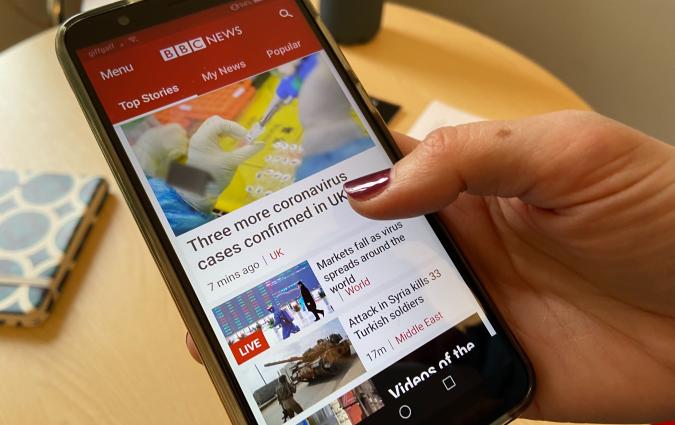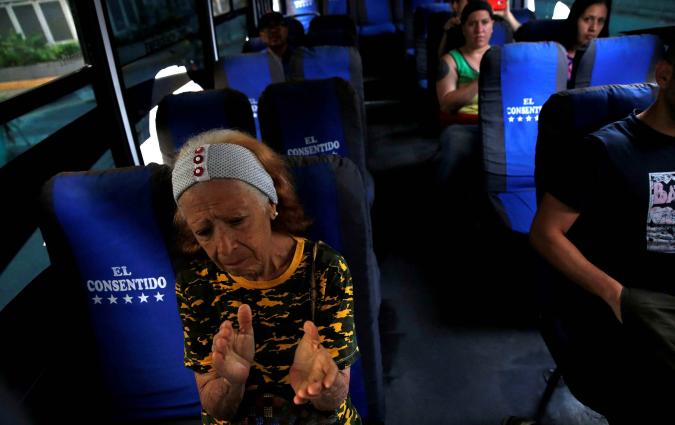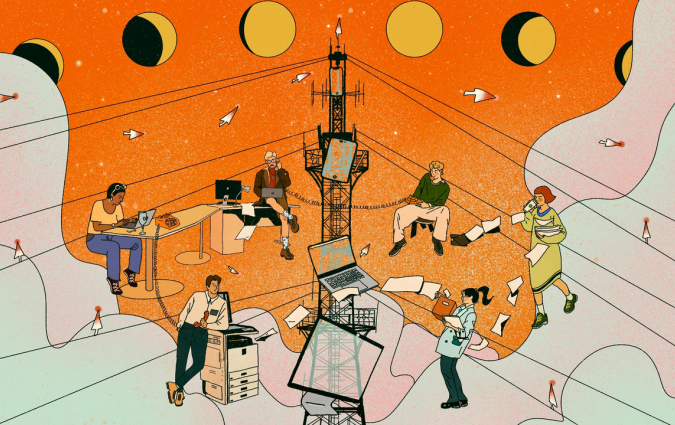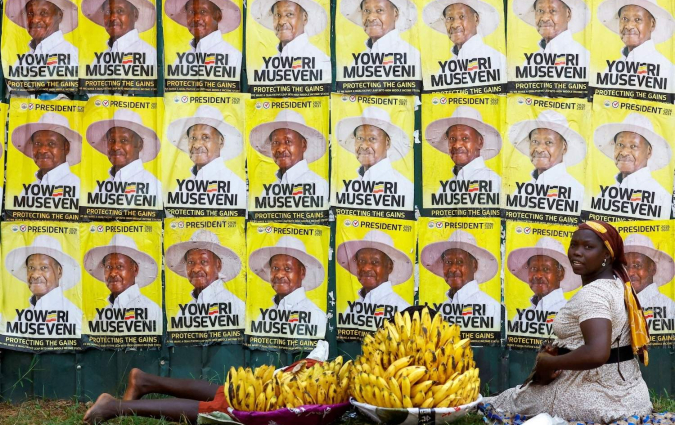"For the zealous and the powerful, press freedom is annoying, even dangerous. They are the true enemies of the people"
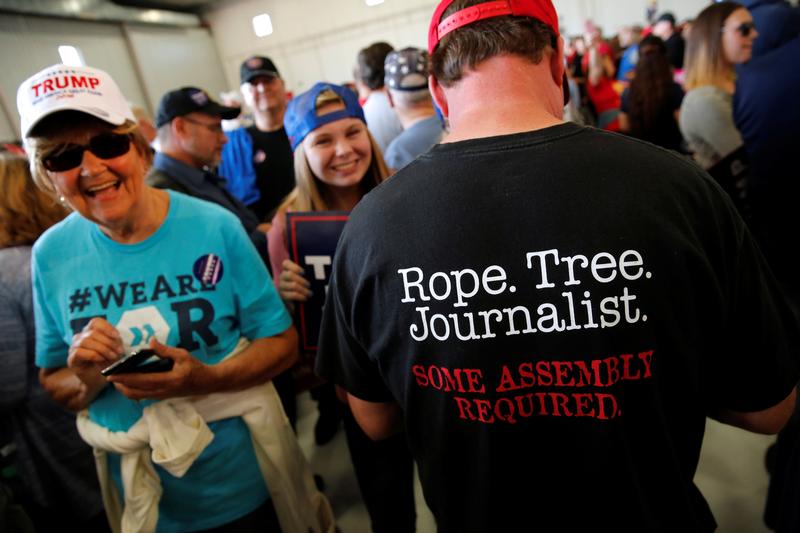
A man wears a shirt reading "Rope. Tree. Journalist." at a rally supporting Donald Trump in Minneapolis in 2016. REUTERS/Jonathan Ernst
This is an edited version of the speech that BBC journalist Clive Myrie delivered at the Society of Editors' media freedom conference on 15 March 2022.
I have been a journalist and writer for well over thirty years. Throughout that time, there have been ups and downs when it comes to press freedom and the right of journalists to speak truth to power, whatever form that power takes.
In democracies worthy of being called democracies, where the voice of the people really matters, is where press freedom has largely been understood to be a good thing. An important thing. A vital thing to the smooth running of a free society.
But we all know that is changing. Press freedom is not any longer for some people a signifier of a healthy democracy. For the powerful, for the zealous true believers in any political party, for the financial backers and influencers, freedom of the press is annoying, frustrating, even dangerous. A plurality of opinion is not what they want. They seek propaganda and the bolstering of their own narrow point of view. They seek affirmation, not debate. They want to shut down conversations, not open them up. They are the true enemies of the people. They are the true enemies of democracy.
These vested interests are now operating in an age that suits them more now than ever before.
We now live in a world of individual, not objective truths. We all now have a greater ability than ever before to seek out views that reflect our own ideas of how the world should work, rather than be confronted with diverse ways of thinking. Social media and the online space allow thousands and tens of thousands of ways to hear and see one point of view: your own. Impartiality and due impartiality are enemies.
What is the effect of all this? Divided, ruptured societies. Us and them. Them and us. A failure to unite in the best interests of everyone.
A scary postcard from America
I offer up as exhibit A the United States, a shining example of the toxicity of our modern age, a fractured society atomised into cliques. A place where you can claim night does not follow day if you say it loud enough, with plenty of gusto. A place where there is no comeback for lies and propaganda. You will profit and succeed even more. Witness the appalling spectacle of the contents of depositions offered up in the case of Dominion Machines versus Fox News and the lie of a rigged 2020 Presidential election.
The pressure on journalists these days to dish out not facts but fiction is immense. The pressure to toe a party line, to pump a point of view, to ignore the truth and disregard that crucial duty we have as journalists to properly inform the public of what is going on. The battle lines are already being drawn in the run-up to the next US Presidential election, and I hope to be there.
Ron Skeans is someone I suspect none of you will have heard of. But I guarantee some of you will have seen his work. He is the bureau camera operator for the BBC based in Washington, DC. He is a great guy and a great shooter, and I worked with him when I worked for the BBC in the US. We have reported from Guantanamo Bay together…and covered so many US midterm elections that I’ve lost count. We have also reported on every single US Presidential election since 1996.
So, imagine my shock when I heard the news that a Donald Trump supporter had attacked Ron at a campaign rally in El Paso, Texas during the 2020 campaign. The thug was wearing a Make America Great Again cap, and he shoved and swore at Ron and other news crews before being pulled away. Thankfully, Ron did not suffer any serious injuries. The BBC later had to write to the White House asking for a review of security arrangements for the media attending Trump rallies.
Of course, we all know what happened before the Trump fan attacked Ron. The President spoke of the "fake news" media and made claims about how the press had misrepresented him. He pointed to the ranks of journalists and said, and I quote, “Look at all the press pack, can you believe that?” to which the crowd responded with loud boos.
BBC correspondent Gary O’Donoghue says he has been spat at by Trump supporters. And at one rally I went to in Tucson, Arizona during the last Presidential election I heard some in the crowd voice their anger at what they disparagingly called the mainstream media.
The United Nations has called Trump’s attacks on the press "strategic," designed to undermine press freedom and "verifiable facts." By attacking the legitimacy of the press, Trump undermines what they say. It means the public will not believe objective truths. They will be more willing to believe the truth as peddled by Trump. Now the 2024 run for the White House is really going to be a barrel of laughs.
The usual suspects
Away from America, where you might think journalists should be safe, the usual suspects have been doing their bit for freedom of the press.
At the end of last year, a member of the Chinese delegation in Bali, where the G20 summit was taking place, shoved a US journalist as she tried to ask about China’s human rights record. White House officials were forced to intervene as the woman who worked for a US television network was pulled backwards by her backpack, causing her to lose balance, before being pushed towards the door by an unidentified Chinese official.
The BBC’s long serving China Correspondent, John Sudworth, was hounded out of the country over his reporting of the mass detentions of Uyghurs in Xinjiang. Foreign journalists are having an extremely tough time getting visas to work in China. Outside scrutiny is a no-go zone for the Chinese and its leaders do not care how that makes the country look even to the point of man-handling a reporter to shut her up on foreign soil.
In the most recent World Press Freedom Index, which lists the countries with the lousiest reputations for the way they treat journalists, a record 28 nations were rated “very bad” places for journalism. Things are getting worse year after year. Billions of people in countries including China, Russia, Saudi Arabia and Pakistan struggle to access journalism produced without intervention from politicians, with reporters in these places often facing threats to their well-being. Autocratic regimes are increasingly willing to crack down on independent media outlets.
The list is produced by campaign group Reporters Without Borders, and it surveys the state of the media in 180 countries and territories. It blames what it calls “globalised and unregulated online information spaces, that encourage fake news and propaganda” for the worsening situation in many countries.
Russia is a case in point, a place that has now banned me and some of my BBC colleagues from entry over our reporting of the illegal war in Ukraine. In Russia, of course, if you call the events across the border a war, you are liable to 15 years imprisonment. There is no independent media in Russia. All TV channels are Kremlin propaganda mouthpieces trumpeting the official line that Russian troops are on Ukrainian soil to save the people and that their actions are part of a ‘special military operation.’
More than a dozen reporters have been killed in Ukraine, some of them deliberately. Two dozen have been injured by gunfire and more than a hundred have been targeted in the course of their work. At least six complaints have been filed by reporters at the International Criminal Court as well as at the Ukrainian prosecutor-general’s office. Attacking journalists doing their job is a war crime.
In Egypt there is no shooting war, but there is a battle over press freedom. Three journalists from the country’s last remaining independent news outlet have just gone on trial in Cairo on charges of misusing social media and “offending members of parliament.” They face up to two years in prison and hefty fines if they are found guilty. The trial stems from a complaint over reporting on corruption at the highest levels of government.
In Georgia, the ruling party tried to introduce a so-called ‘foreign agents' law’ which would have severely limited press freedom and civil liberties. It required non-governmental and media organisations who receive more than 20% of their funding from abroad to declare themselves as "foreign agents" or face hefty fines and imprisonment. But mass street protests forced the government to back down and scrap the bill, which was styled on similar legislation in neighbouring Russia.
Threats to press freedom in the UK
It is not just tyrants and bullies in power who think abusing the press is the way to get what they want. Two of my BBC colleagues here in the UK last year were accosted and threatened by ordinary members of the public while simply doing their jobs.
A few months ago, five so-called ‘anti-lockdown protestors’ who had verbally attacked BBC Newsnight’s Political Editor Nick Watt in the street were found guilty of using threatening, abusive or insulting words or behaviour, with intent to cause harassment, alarm or distress.
Footage of what happened showed Nick being shouted out as he walked through Whitehall. He was branded a “traitor” and chased as he tried to find a safe place away from the crowd. The prosecution in the case said he was targeted solely because of his job. He was picked out because he was wearing a BBC lanyard around his neck. The judge said the “crimes were committed against someone who was providing a service to the public.”
My other colleague James Cook, the BBC’s Scotland Editor, was yelled at by demonstrators outside a Conservative Party leadership husting in Perth. He was branded a “traitor,” a “scumbag rat” and a “liar.” First Minister Nicola Sturgeon had to issue a statement saying: “Hurling abuse at journalists is never acceptable. Their job is vital to our democracy and that job is to report and scrutinise, not support any viewpoint.
Then, of course, there is the case of the LBC reporter Charlotte Lynch, arrested by Hertfordshire Police while reporting on Just Stop Oil's M25 protests last November. Charlotte was detained for seven hours. She was carrying her press credentials and an LBC-branded microphone. She admitted she was "absolutely terrified" throughout the ordeal. Her experience led to an amendment, number 54 to Clause 18, of the current Public Order Bill, offering special protections for journalists covering protests. But the fact that this amendment had to be written in our mature democracy is shameful and makes this country look no better than Russia or China or Iran or Saudi Arabia. But at least it has been written.
This trade we are all engaged in is a noble craft. As the towering figure of British journalism James Cameron once observed, "[it allows me to] meet people of significance, people with great stories to tell, meaningful people who wouldn’t have had the slightest time for me as an individual but did have time for me as a reporter.”
James went on to say: “I’ve been what friends call a journalist and what non friends call a God-damned reporter all my life, largely because I liked it, and I never regretted it.”
We should never ever apologise for what we do or regret doing it, and we must fight for our right to do it.
In every email we send you'll find original reporting, evidence-based insights, online seminars and readings curated from 100s of sources - all in 5 minutes.
- Twice a week
- More than 20,000 people receive it
- Unsubscribe any time


